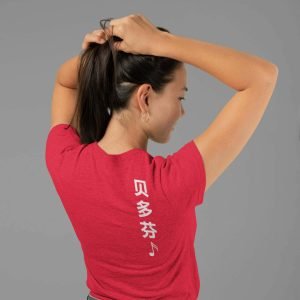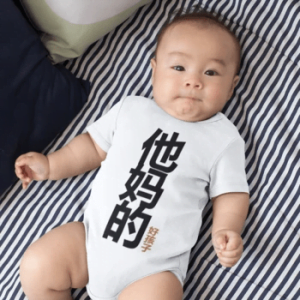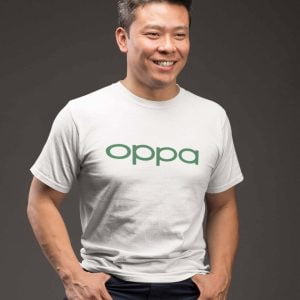How Do You Use ‘Gai Gai’ Without Getting Judged by Your Friends?
If you’ve ever whispered “gai gai” only for your friends to smirk or your HR manager to tilt their head in confusion, you’re not alone. “Gai gai” is cute, catchy, and full of character—but using Singlish phrases out loud can sometimes feel like social skydiving without a parachute. No more paiseh feelings. Today, we’re dissecting how to drop that sweet local expression into your conversations without sounding out of touch—because everybody deserves to gai gai in peace while using ‘gai gai’ confidently.
-
Chinese, Chinese New Year, KaoBeiKing, T-shirts, Typography, Women
Price range: $30.00 through $38.00 Select options This product has multiple variants. The options may be chosen on the product page
TL;DR Summary
- ‘Gai gai’ means: Going out for leisure—think jalan-jalan with extra flair.
- Cultural roots: Borrowed from Cantonese, ‘gai gai’ has nestled into Singlish like a comfy HDB sofa.
- Main challenge: People think Singlish isn’t “proper.” Spoiler: That’s snob talk.
- Solution: Use it with context, confidence, and the right vibes—we’ll show you how.
- Bonus: Real tikam-level examples of using Singlish phrases without sounding like you’re in a forced NTUC ad.
The Cultural Significance of ‘Gai Gai’ in Singapore
First off, let’s get real about what ‘gai gai’ actually means. It’s essentially Singapore’s answer to “going out to relax, window shop, or roam aimlessly with some shiok vibes.” Sounds cute, right? This beloved Singlish phrase originated from Cantonese, where ‘街街’ means to stroll through the streets. But here in SG, it’s grown lah—it’s become a lifestyle that reflects our unique language identity.
Your ah ma might say she’s going gai gai when she’s off to the wet market with her kakis. You, on the other hand, could be using ‘gai gai’ confidently for your mid-week Dempsey escape. Either way—it’s a linguistic hug that signals, “I just wanna chill, bro.” And that’s exactly why this Singlish phrase deserves some street cred in modern Singapore.
Why the Guilt Around Using It?
Thanks to years of linguistic colonisation (hello, English medium schools), many of us were taught to treat Singlish like some back-alley dialect. But truth bomb: Singlish phrases are a linguistic badge of local identity. ‘Gai gai’ doesn’t degrade the conversation—it deepens it. It shows warmth, familiarity, and that underlying human need to be relatable in our own terms while incorporating Singlish into conversations naturally.
-
Chinese, KaoBeiKing, Singlish/Hokkien, T-shirts, Typography, Women
Price range: $30.00 through $38.00 Select options This product has multiple variants. The options may be chosen on the product page -
Chinese, Chinese New Year, Ladies, Mens, T-shirts
Price range: $35.00 through $43.00 Select options This product has multiple variants. The options may be chosen on the product page
Embracing Singlish: Tips for Confident Conversations
Let’s squash the paiseh vibes and usher in a confident Singlish renaissance. Want to know how to add ‘gai gai’ into your vocab without sounding like an uncle trying to be cool? These Singlish tips will help you master local expressions effortlessly:
- Start Casual: Use ‘gai gai’ in low-pressure scenarios like WhatsApp chats. E.g., “Wanna gai gai this Sat?”
- Know Your Audience: Use it with fellow locals or those familiar with Singaporean language trends. Don’t try it mid-Zoom call with your boss from Germany lah.
- Inflect The Tone: Adding a playful or natural tone helps Singlish phrases flow without raising eyebrows.
- Ease It Into Group Chats: Nothing breaks the ice like a well-timed “Let’s go gai gai and look see look see.”
- Observe and Mimic: Learn how others seamlessly integrate local expressions. Got that one colleague who slays Singapore slang? Channel them.
Overcoming Judgment: Using ‘Gai Gai’ with Pride
Ah, here lies the dragon: judgment. From friends who side-eye you for sounding “uncultured” to colleagues who low-key think Singlish is “broken English,” the struggle is real. Here’s how to flex these local expressions and keep your rep golden while using ‘gai gai’ confidently.
Handle Kaypoh Kias Gracefully
When someone chuckles and says, “Eh, you speaking like ah lian!” just smile and hit them with this gem: “Better ah lian than no local flair lor.” Cultural ownership, baby. Breaking language stigma starts with owning your Singaporean identity.
Balance is Key
You’re not here to become a one-man-Boon-Lay-dialect-drama. Use Singlish phrases to enhance your speech, not replace it all. And when you mix it up well with daily conversations, your street cred goes up, not down.
Real-Life Examples: Incorporating Singlish into Daily Chats
You’re probably wondering, “Okay, but how ah?” Don’t worry, here are real, juicy snippets of how you can embed ‘gai gai’ (and other Singlish phrases) into your daily conversations while following modern language trends.
Examples Worth Copy + Paste
- Scenario: You need a cucuk-cucuk plan for the weekend.
Text: “No plans yet… maybe go Orchard gai gai?” - Scenario: Coupling duties.
Text: “The gf wanna gai gai la… so I’m on bag-carrying duty.” - Scenario: Kanchiong meeting day balance.
Text: “After this Zoom, we all deserve some serious gai gai leh.” - Scenario: Light flex social post.
Caption: “Gai gai + kopi = recipe for peace.”
See? Effortless. You’re practically a TikTok Singlish influencer now, incorporating local expressions like a pro.
Breaking Stereotypes: The Evolution of Singlish in Modern Society
The rise of Singlish phrases in marketing, comedy, even education proves they’ve gone from ‘cannot use’ to ‘national treasure’. What used to be whispered is now blasted on MRT ads and heartland banners. Even literature and theatre have embraced the cadence of local expressions, showing us they’re legit, expressive, and beautiful parts of our language identity.
-
Chinese, KaoBeiKing, Quote, Romper, Typography
$25.00 Select options This product has multiple variants. The options may be chosen on the product page -
KaoBeiKing, Men, Parody, T-shirts, Typography
Price range: $30.00 through $38.00 Select options This product has multiple variants. The options may be chosen on the product page
So Why the Stigma?
Old-school mindset, lor. But this is slowly shifting, thanks to Gen Z’s power to redefine cultural belonging through embracing Singlish. You’re part of that movement every time you say, “Let’s gai gai before the makan” while using ‘gai gai’ confidently. Own it.
Cost Guide: What You “Pay” for Not Using Singlish
Oh, you thought we were just joking about price? Not really when it comes to incorporating Singlish into conversations:
- Social Relevance: Lose out on authentic connections with locals who appreciate language trends.
- Identity Dissonance: Sounding ‘international’ might cost you local flavour and cultural expression.
- Missing the Laughs: So many jokes make sense only when you know Singlish phrases and their rhythm.
No one is charging GST, but the cultural cost of rejecting local expressions? Quite high, leh.
Frequently Asked Questions
- Is it okay to use ‘gai gai’ in professional settings?
Honestly? Depends on your office culture. Use discretion, and if you’re in relaxed local teams—using Singlish phrases could actually score relatability points. - How do I explain ‘gai gai’ to my non-Singaporean friends?
Say it’s like “retail therapy without the therapy” or “aimless walking to feel alive.” Then say it again with a smile—they’ll get this local expression. - Can Singlish phrases like ‘gai gai’ be used in writing?
Yes—but choose the platform wisely. In blog posts, creative writing, or meme captions for daily conversations? Confirm + chop approved. - What’s the best way to learn how to use local expressions?
Be around people who speak them, watch local shows, and don’t be afraid to try incorporating Singlish! Trial and paiseh is part of the package. - Is using Singlish phrases ‘bad English’?
Nah. They’re different from English. Think of Singlish as a remix that’s equally valid and vibey in its own right as part of Singapore’s language identity.








